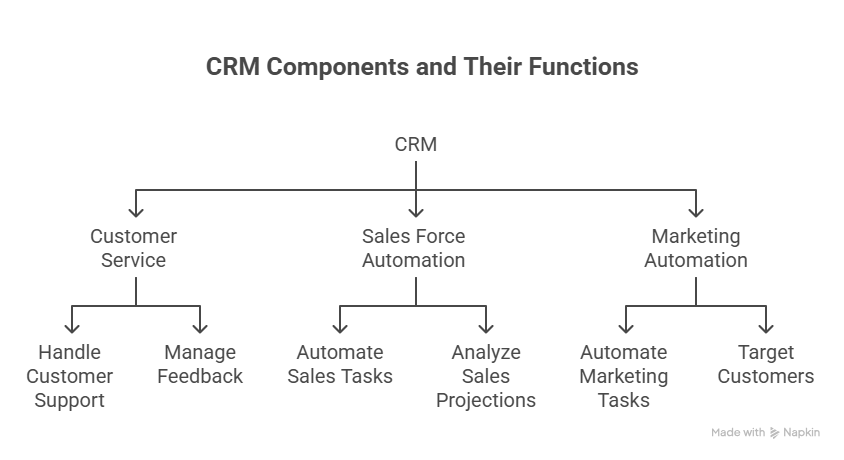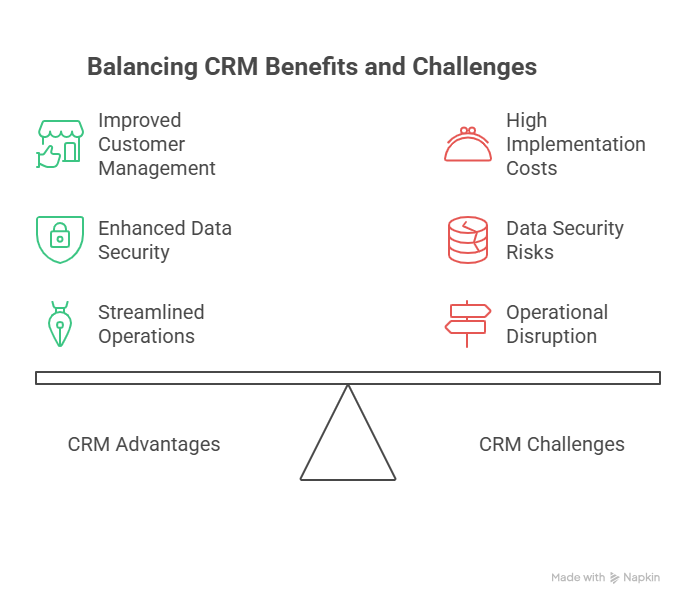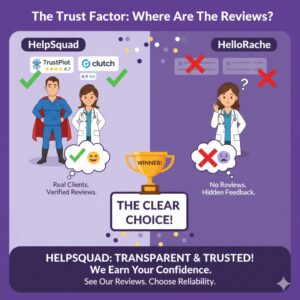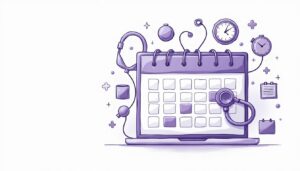Customer Relationship Management (CRM)
30 Jan 2024 By: Michael Kansky
Updated

What is CRM?
Customer Relationship Management (CRM) is a way for businesses to better understand and connect with their customers. It uses strategies, processes, and tools—often special software—to manage customer information, track interactions, and improve communication.
In simple terms, CRM helps businesses:
- Organize customer data in one place.
- Automate tasks for sales, marketing, and support teams.
- Understand customer behavior to offer more personalized experiences.
The goal is to build stronger relationships, increase customer satisfaction, and drive business growth.
History of Customer Relationship Management
Customer Relationship Management began in the 1970s. Back then, businesses measured customer satisfaction with yearly surveys or by asking face-to-face. They used basic mainframe systems to automate sales. These systems could only sort customers into spreadsheets and lists.
In the 1980s, the notions of database marketing were introduced. This way, the customer data is gathered and analyzed by a person. However, in the 1990s, Customer Relationship Management took off quickly. This was because of the internet and better computer technology.. Consequently, they gained more storage space and had an opportunity to work with more detailed data.
Modern CRM
The advanced Customer Relationship Management software links all customer contact points. These include marketing, sales, consultations, digital commerce, and more. Modern CRM isn’t just for sales and marketing anymore. It’s expanded to include service and support, giving a full view of the customer.
The arrival of cloud computing catalyzed migration of CRM systems to the form which small businesses can afford as well. CRM (Customer Relationship Management) is a tool available for businesses of any size to utilize. It helps simplify processes and improve customer interactions.
Components of Customer Relationship Management
CRM comprises three main elements: Consumer Service, Sales Force automation and Marketing Automation. Furthermore, each element pertains to the maintenance of customer relations dealing with their different aspects targeting making the experiences better for the customers that are existing, as well as new.
Each component is a whole by itself and it gives respective specifications and peculiar features. Moreover, they make a good team in as much as it is an issue of drawing of a vivid picture of the customer relations and in taking of informed orders.

Customer Service
Customer service is a key part of CRM solutions. It gives companies tools to handle customer support. This includes tracking service requests. It also includes managing contracts and schedules, handling appointments, and dealing with product returns and warranties. It’s all about making a better customer experience.
Customer service CRM also includes tools for managing customer feedback and complaints. This lets businesses respond to customer issues. It helps them improve their customer satisfaction.
Sales Force Automation
SFA, known as sales force automation, is a component of CRM systems. It automates various sales tasks, such as order processing, contact management, information sharing, and order tracking. It also oversees inventory and customer data, analyzes sales projections, and assesses employee performance.
SFA makes sales work smoother, cuts down on paperwork for sales people, and lets them sell more. It also shows managers the whole sales process and how well it’s going, so they can make smart choices.
Marketing Automation
Marketing automation is part of CRM software. It automates repetitive tasks like sending lots of emails and social media messages. It also interacts with people visiting your website, organizes client data, and sends out campaign emails. Additionally, integrating tools like the Snowflake MySQL connector can help streamline data management and enhance reporting capabilities. It also shows how well your marketing campaigns are doing.
Marketing automation lets businesses target customers. They send automated messages across email, web, social, and text. Workflows send messages based on sets of instructions. Workflows may be defined by templates. They can be custom-built from scratch. Or, they can be modified mid-campaign to get better results. You can use omnichannel tools like Brevo or specialized tools like Crowdreply for Reddit or LinkedHelper for LinkedIn. If you need help with messaging for channels like Reddit, you should consider collaborating with an agency like Odd Angles Media.
What are the benefits of Customer Relationship Management?

CRM systems provide many benefits to businesses. These tools assist businesses in gaining a deeper understanding of their customers, consequently increasing customer satisfaction. By using connections such as Google Analytics integration with Salesforce, companies can bring together behavioral data and CRM insights for a clearer view of customer actions and preferences. By retaining customers and enhancing products and services, they also facilitate the identification of new selling opportunities and pinpoint the most profitable customers and this leads to more sales.
Moreover, CRM systems provide a centralized platform for storing all customer-related information. This helps workers find and share information easily, which makes teamwork better and work faster.
Improved Customer Satisfaction
One of the main plus points of CRM systems is that they bring higher level of customers’ satisfaction. Through the knowledge of the customer without any illusion firms can satisfy the customer’s needs. This will improve the customer marketing experience. It will ensure top service quality. And, it will lead to higher customer satisfaction.
Moreover, CRM systems give enterprises an opportunity to personalize their contacts with the customers as well. This his the result of more satisfied customer by improving the quality of service.
Increased Sales and Profitability
The CRM solutions assist in achieving sales increase and augmentation of the profit. Such endeavors create platforms for comprehensively understanding the customer and consequently, help enterprises to notice new selling options as well as to aim the marketing activities in a more efficient manner.
Also, CRM systems can help businesses find their most profitable customers. They can then focus on keeping these customers. This can lead to increased customer loyalty and higher sales.
Improved Efficiency and Productivity
CRM systems are driven by automating the monotonous tasks and therefore grant the employees all the information required to work at the highest efficiency. Such basics are freed up for employees to more effectively accomplish their responsibilities which leads to the increase in productivity. As companies scale, this same focus on efficiency often extends beyond internal operations to hiring, where improving hiring efficiency by streamlining recruitment workflows and reducing time-to-hire becomes critical to sustaining productivity
Furthermore, CRM systems provide a centralized platform for storing and sharing information. This can improve collaboration and communication among employees, leading to improved efficiency and productivity.
Challenges of CRM

On the one hand, CRM systems provide many advantages, but also on the other hand, they yield some challenges. The CRM solution will also have expenses like the acquisition of a system, training the staff and updates. Businesses may also have challenges in connecting the new CRM system with the existing firm IT infrastructure. For organizations adopting Microsoft’s stack, many engage dynamics crm consulting services to streamline data migration, integrations, and end-user training.
Consequently, one of the challenges enterprises would face would be to ensure the clients’ confidential information is kept safe. This is especially considered that data breaches, cloud privacy and other kinds of cyber risks are increasing continuously
Cost and Implementation
In addition to that, businesses often confront the problems of securing customers’ data and privacy. This is even more important against the background of the increasing number of data breaches and cloud privacy problems.
Besides the mentioned change of a CRM system itself business operations can be disrupted. The business must make considerable preparations to minimize the disruption and the transition avail a seamless environment in the new system.
Data Security and Privacy
Ensuring the security and privacy of customer data is a major challenge for businesses using CRM systems. Businesses need to use strong security measures. These protect customer data from unauthorized access and breaches.
On top of that, data privacy regulations are significant, which could be dissimilar depending on the particular country and the industry. Here, this can be a substantial problem, most likely with those companies which have operations in a number of countries or sectors because they shall strive to meet and comply with different sets of rules and regulations in these countries or sectors.
Future of CRM
It is expected, therefore, that CRM in the future will be essentially molded by enlarging technological opportunities and the altering needs of the buyers. Thus, companies will continue to seek the CRM systems to enhance the connections with clients and business operation system.
AI, machine learning and big data analytics are the newest technologies set to redefine the CRM. Their incorporation into CRM systems can help to improve customer data analysis, predict customer actions, and individualize communications with customers much more.
Expert Systems
Artificial Intelligence and Machine Learning are important to CRM because this type of technology helps businesses to understand the customers data better, thus this can personalize customer interactions.
As another instance, AI can be put across to the review of customer data and the spotting out of the most probable buyers out of shoppers or the probable drop-out customers. It will add a value to the marketing of these businesses which would eventually result in their higher rates.
Big Data Analytics
As big data analytics is one amongst the technologies that we will talk about, next. Big data analysis is a close and thorough examination of large and complicated data sets that helps; to unravelling things that probably would not have been seen before.
Big data analytics lets businesses analyze customer data in real-time. They can then gain a deeper understanding of their customers. This can help businesses make better choices. It can improve their customer relationships and offer personalized service.
Real-world Case Studies
Coca-Cola CRM
Coca-Cola, one of the world’s most recognized and enduring brands, operates in over 200 countries with more than 200 product lines. Its longevity and global influence are closely tied to its exceptional customer relationship management (CRM) strategy, which centers on spreading optimism and happiness through every aspect of its brand—from marketing and packaging to customer interactions. To manage its vast network of clients and operations, Coca-Cola employs advanced CRM systems such as SAP for global enterprise management and Salesforce in specific regions for business flow, connectivity, and contact management. This integrated CRM approach enables Coca-Cola to maintain consistent customer engagement and loyalty worldwide.
Frequently Asked Questions
Trending Now
CRM software supports businesses in efficiently managing customer relationships by centralizing contact information, automating sales and marketing tasks, and enhancing internal communications. These systems are essential for improving customer service, increasing sales, and retaining customers by leveraging detailed analytics and personalized engagement strategies. Suitable for businesses of various sizes, CRM tools are pivotal for organizations aiming to optimize their customer interactions and achieve business success in a digitally evolving marketplace. For businesses seeking a customizable and scalable CRM solution, partnering with experts can be invaluable. GrowSherpa, an Odoo implementation and development partner, specializes in tailoring CRM systems to meet unique business needs, ensuring seamless integration and enhanced customer relationship management.
In today’s digital world, businesses need to blend CRM (Customer Relationship Management) tools with a strong customer experience (CX) strategy to meet the high expectations of modern consumers. CRM software helps companies understand and connect with customers by tracking their interactions and preferences, making it easier to offer personalized services. CX, on the other hand, focuses on creating a seamless, satisfying experience at every touchpoint with the brand. By using CRM effectively, businesses can improve customer service, tailor experiences to individual needs, and operate more efficiently. Investing in CRM is a step towards building better relationships with customers, offering them the speedy, customized attention they demand in a way that’s simple and efficient for the business
Conclusion
CRM is a planned method of improving the relationship of a company with its customers continuously. The principal tasks of the proposed marketing plan are improving purchasing experience, loyal customer base, and sales. CRM systems are designed such that companies get customer needs feedback, internal operations become efficient and value is delivered to the stakeholders.
CRM systems offer advantages as well as drawbacks. However, individuals skilled in strategy and planning can effectively leverage these systems to their advantage, turning potential problems into opportunities for growth and success
Enhance your Customer Relationship Management (CRM) with HelpSquad BPO’s expert solutions. Bid farewell to the challenges of managing customer interactions and welcome a new era of efficiency and bilingual support at an affordable rate of just $8.50 per hour. Our professional agents are equipped to transform your customer service experience, ensuring no customer is left waiting. Seize this opportunity to elevate your service standards. Start your trial today and join the ranks of thousands of enterprises thriving with the support of HelpSquad’s virtual assistants and round-the-clock customer service team.


